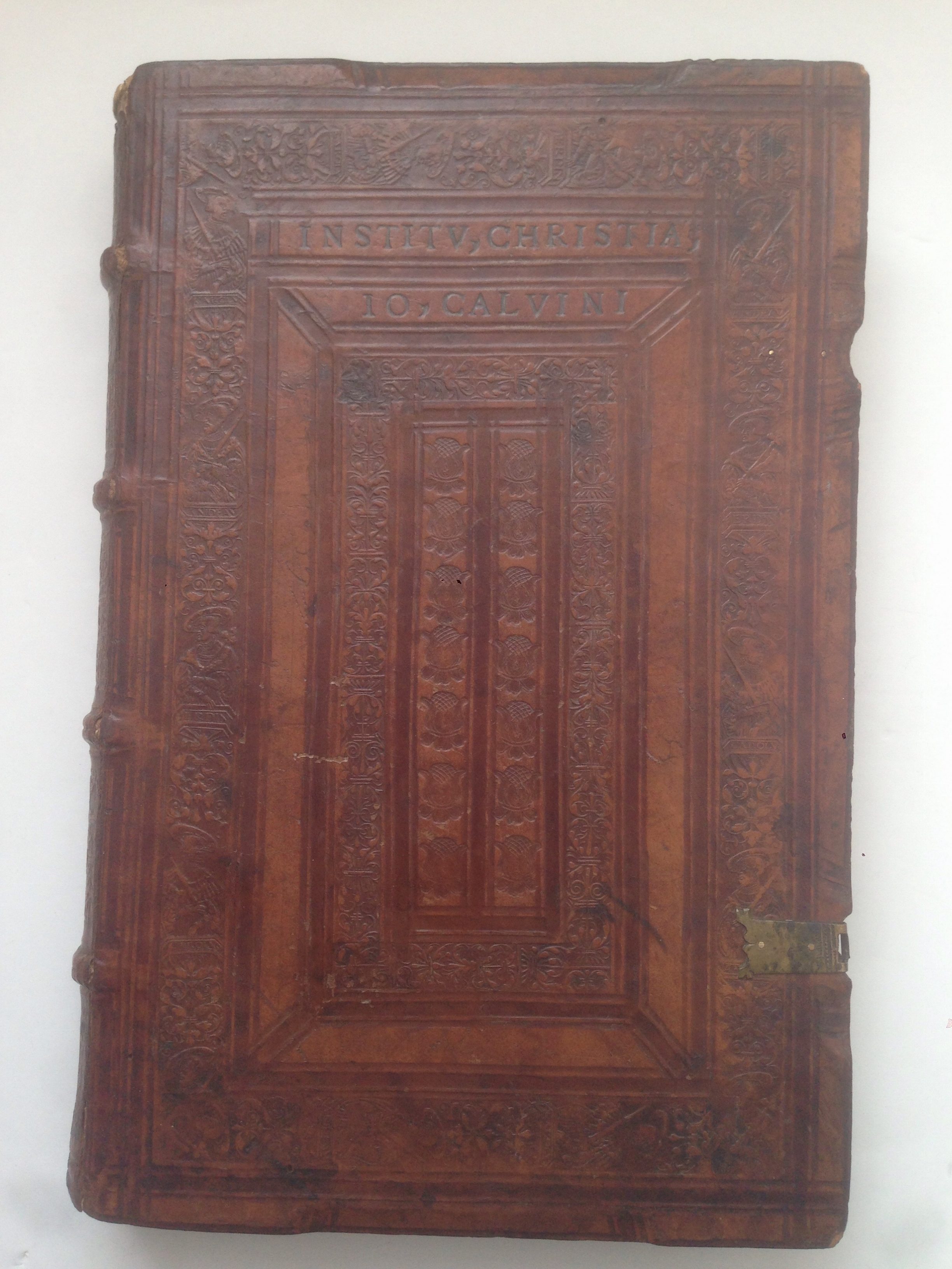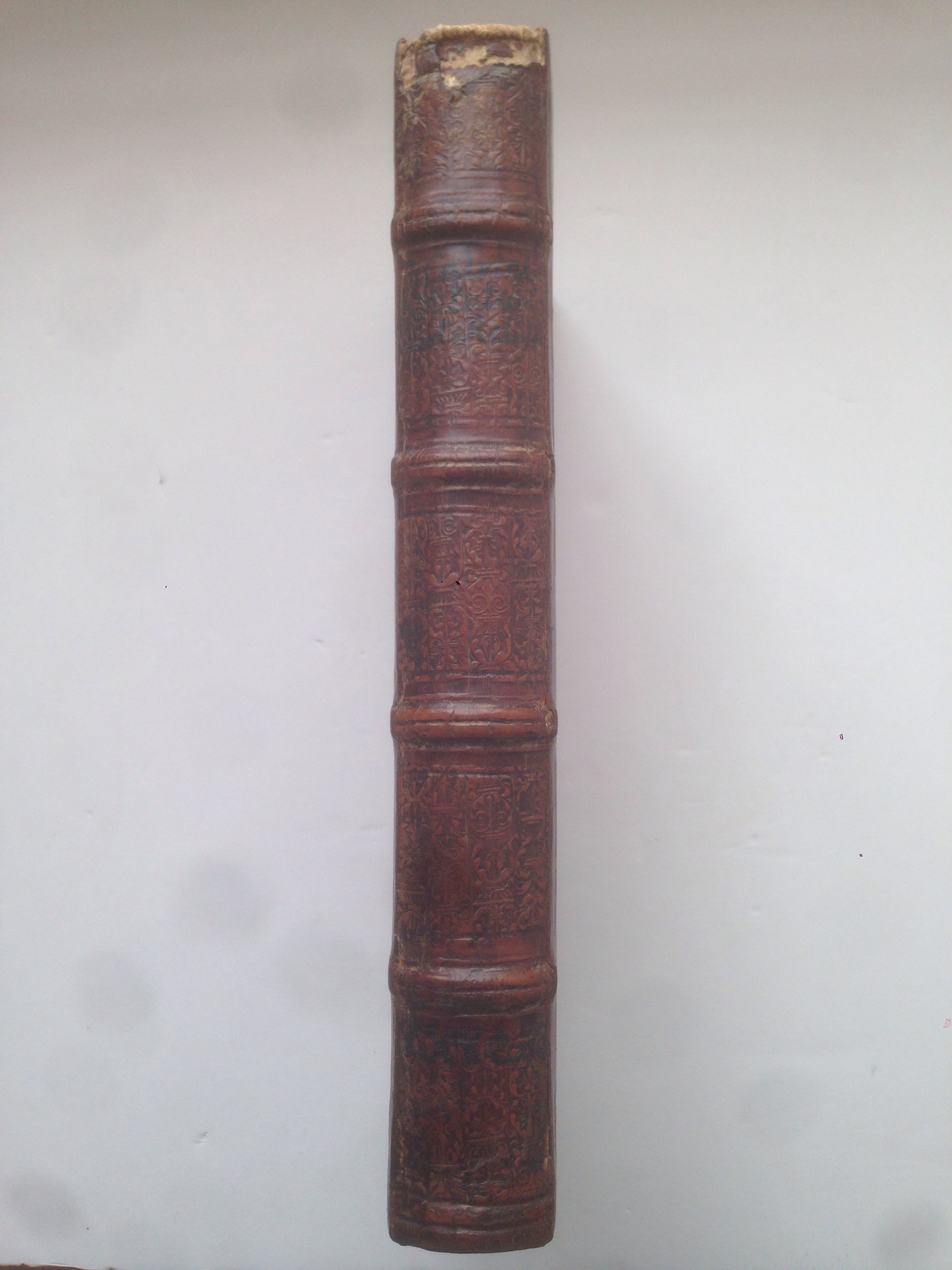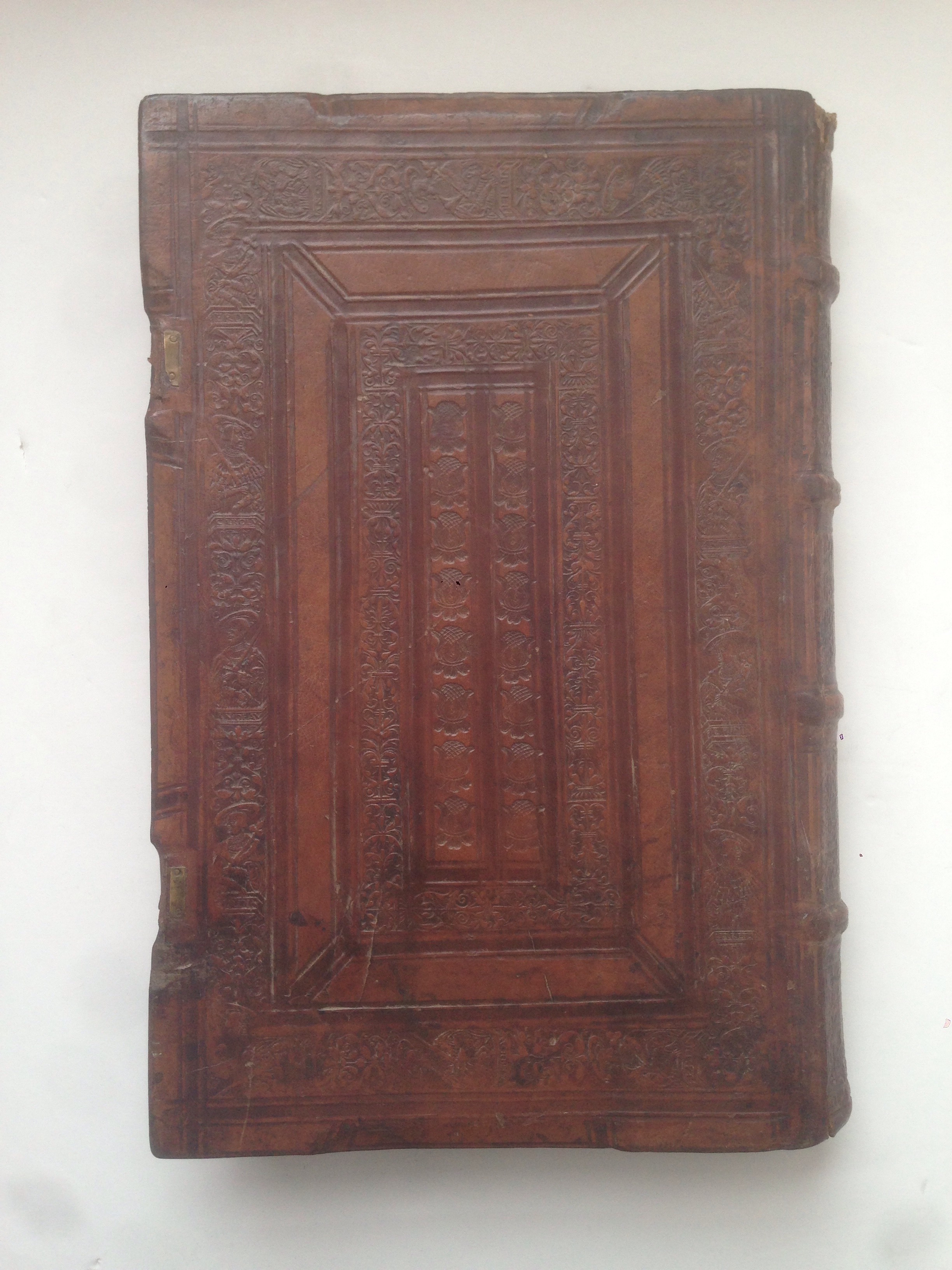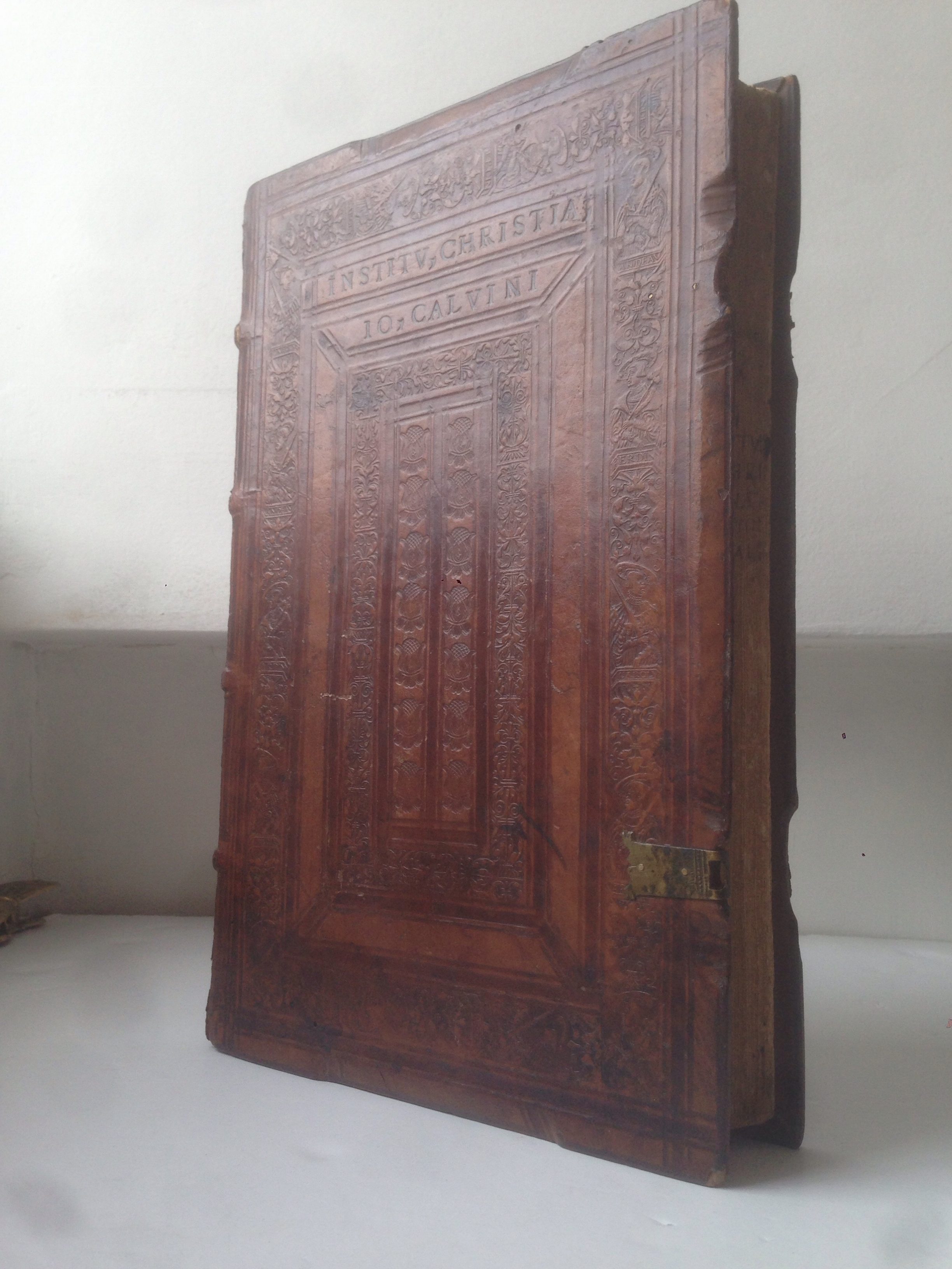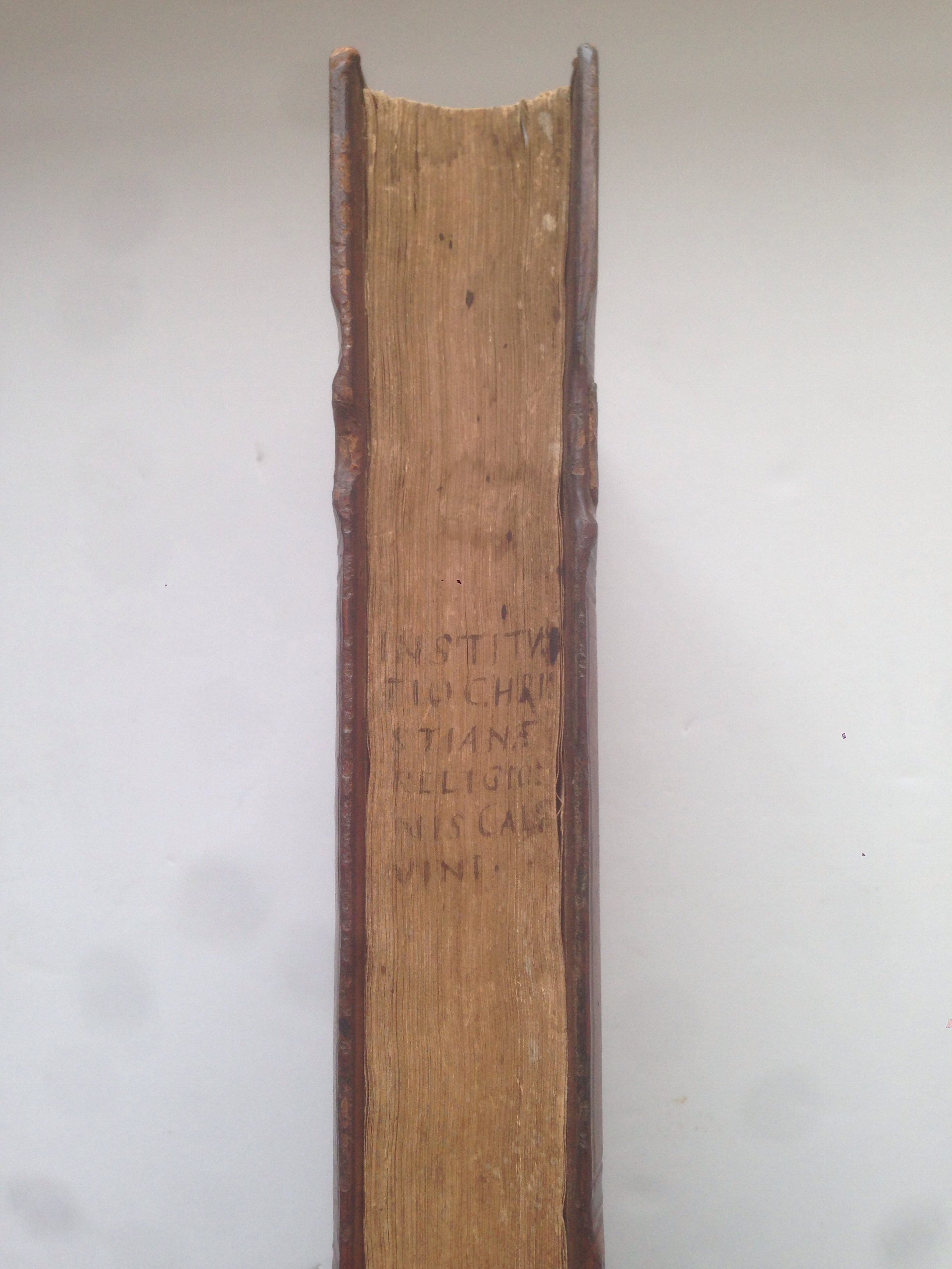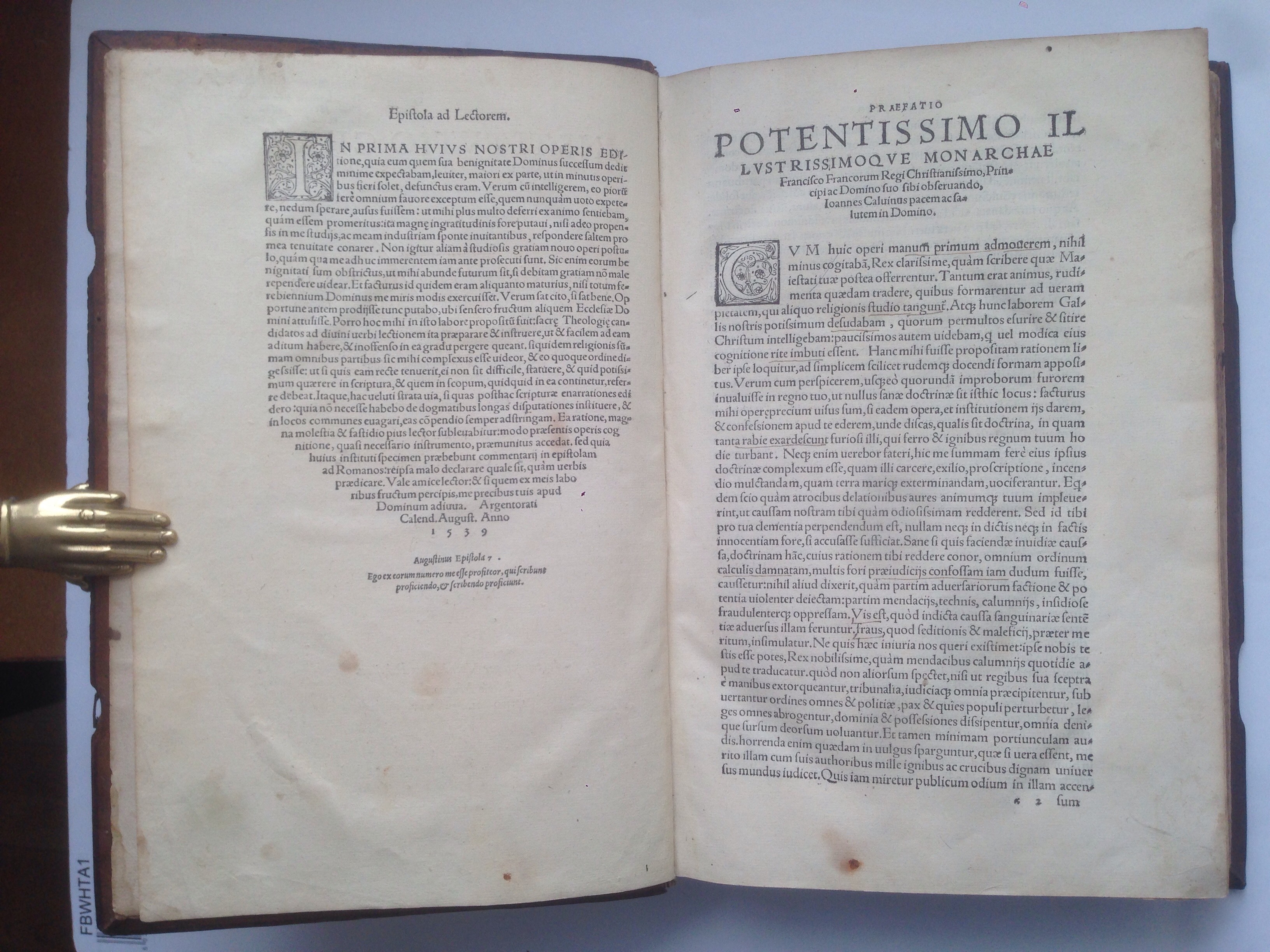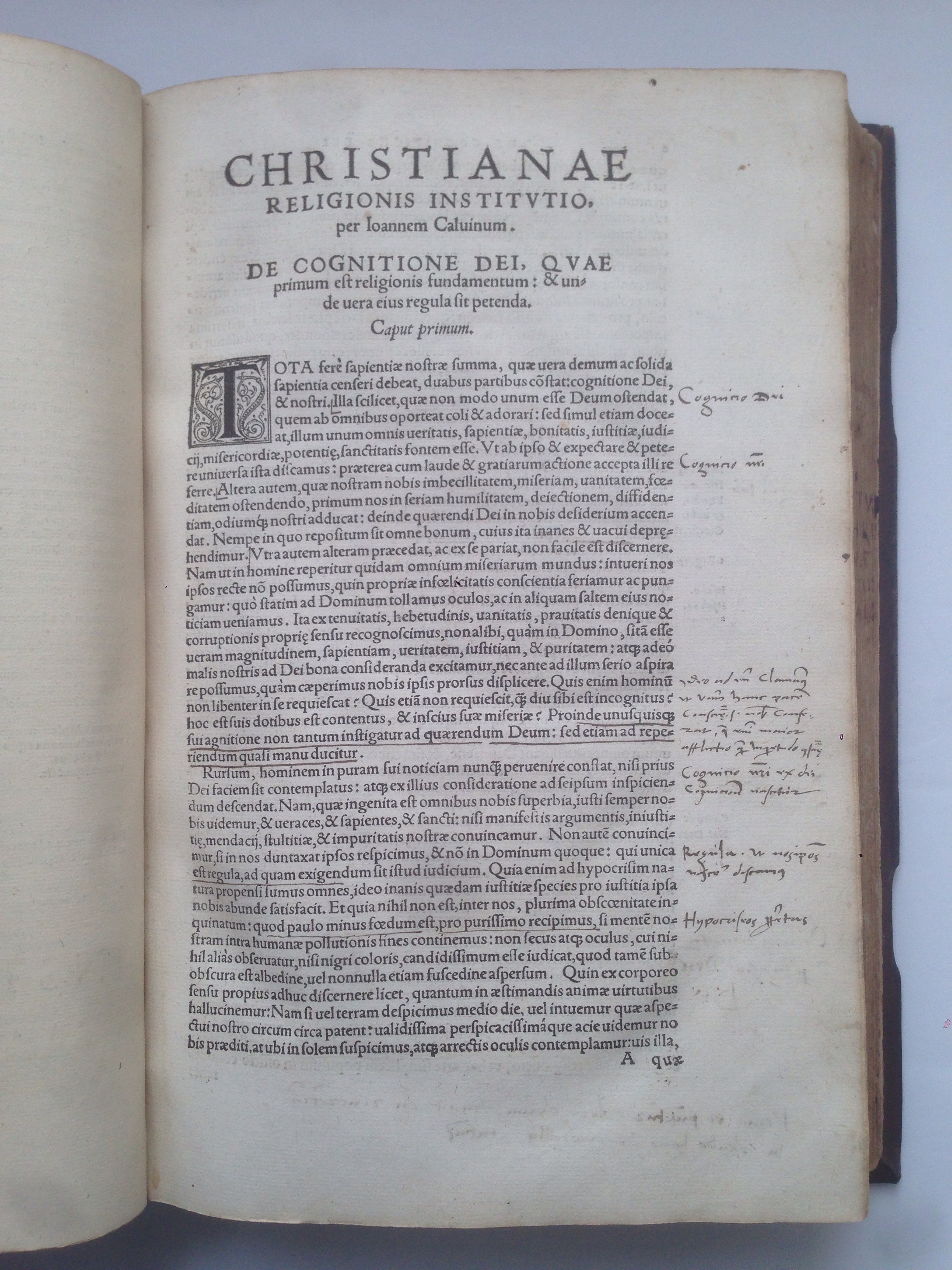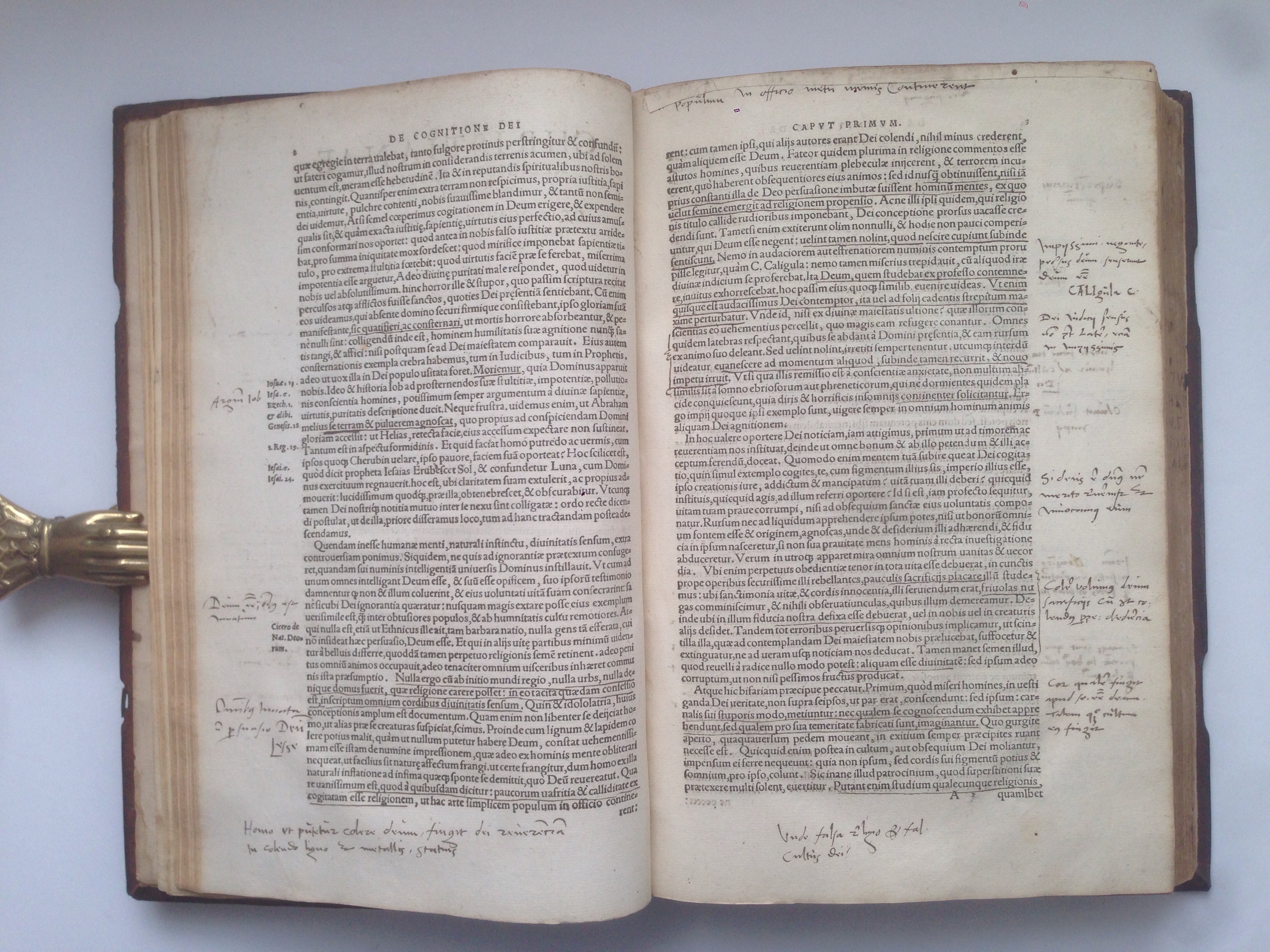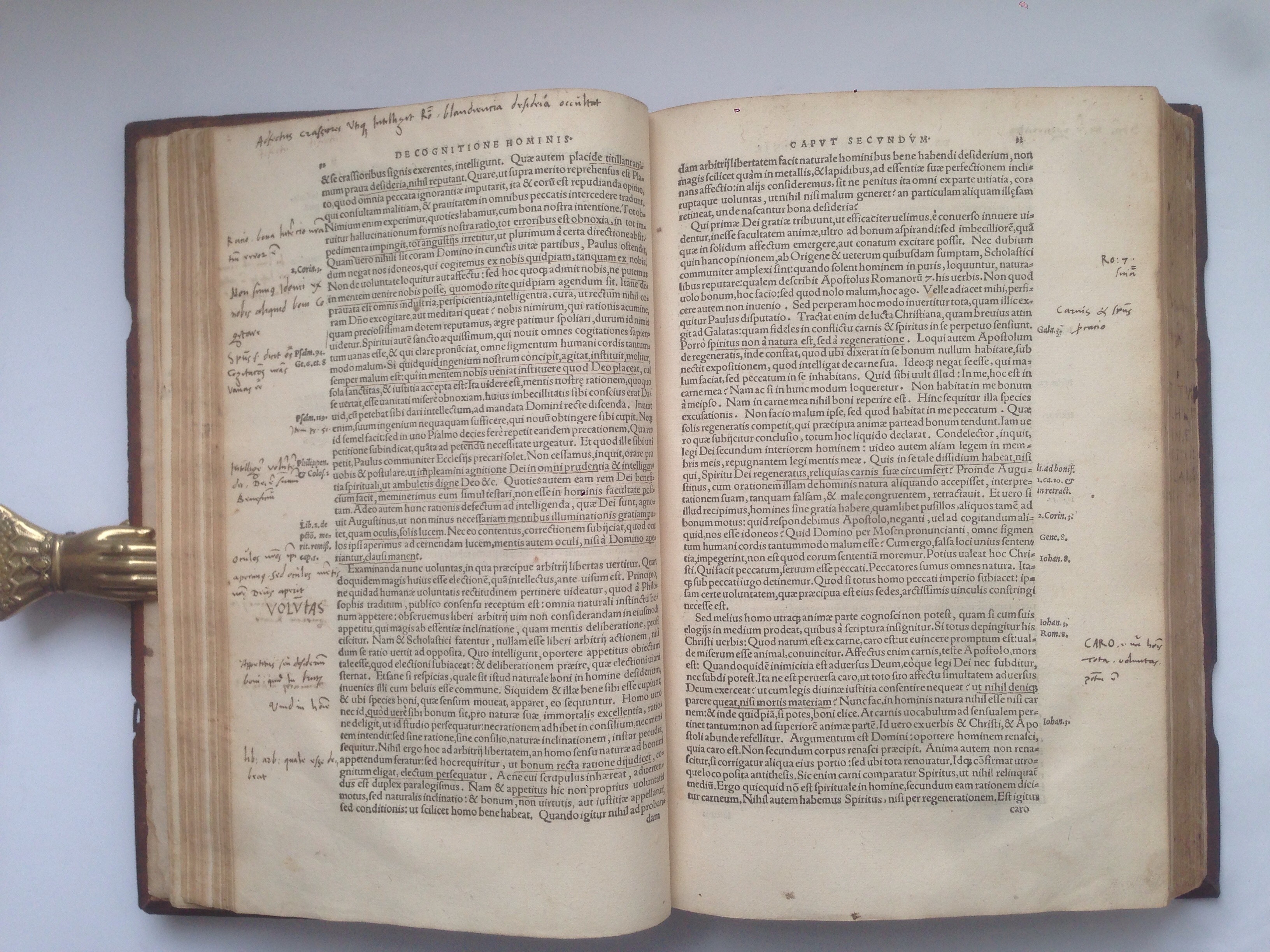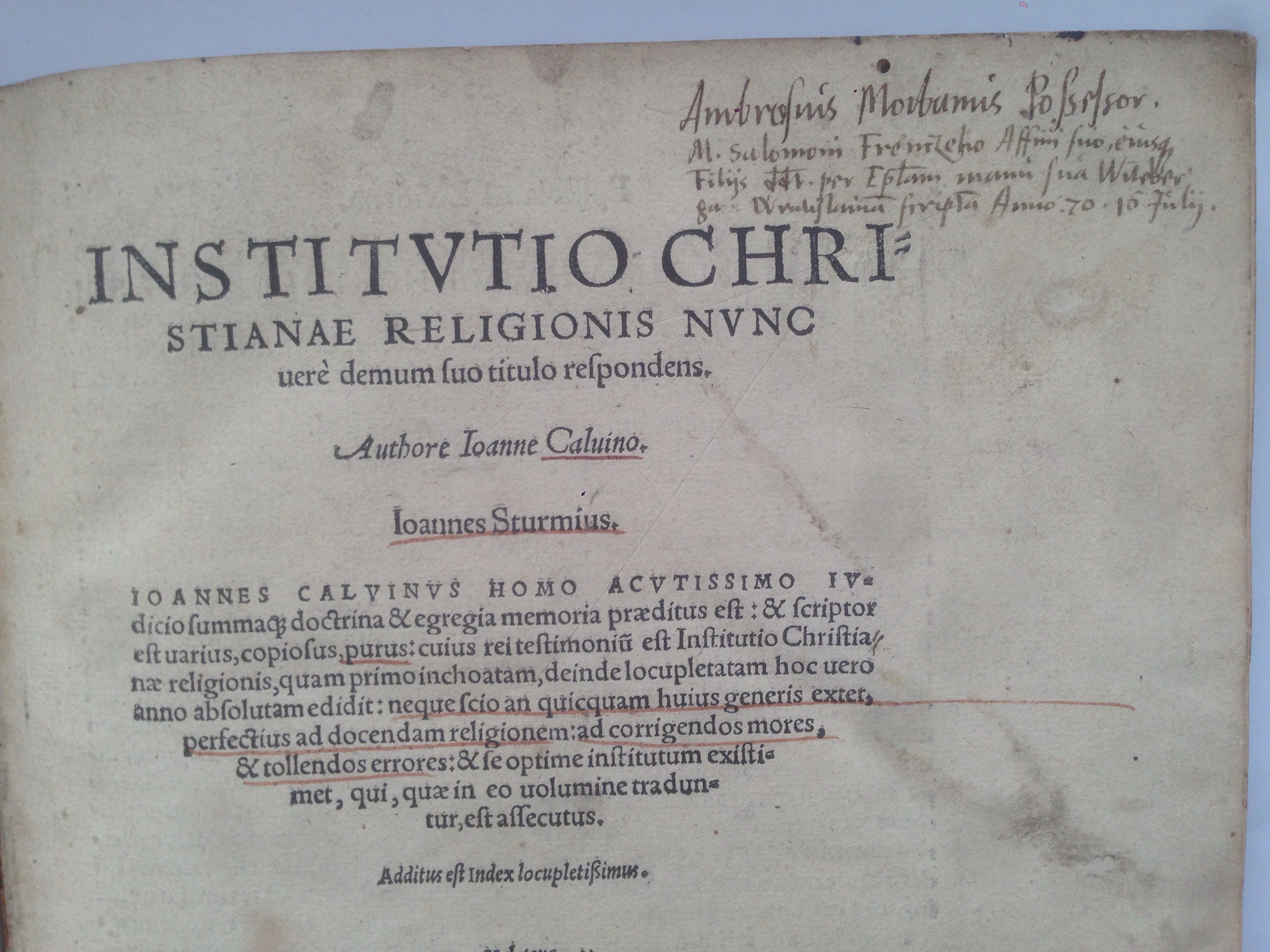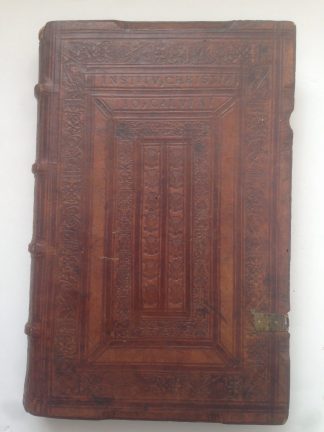CALVIN, Jean
CELEBRATING THE OTTOMAN DEFEAT?
Institutio Christianae religionis
Strasbourg, Wendelin I Rihel, 1545£15,000.00
Folio. pp. (xliv) 505. Roman letter, side notes in italic, occasional Greek. Woodcut printer’s device to t-p, decorated initials. Light age browning, water stain to lower outer corner of last two leaves, one old marginal repair, the odd thumb and marginal ink mark, small wax spots to t-p not affecting text, single wormhole to upper margin of first few gatherings, ms title to fore-edge. Very good copy in contemporary calf over bevelled wooden boards, lacking clasps, finely blind-tooled to a three-panel design, fleurons and all’antica motifs to centre, title above, figures of Charles V, Ferdinand, King of Bohemia, and ‘AN DE AV’ (Andreas de Auria or Andrea Doria) to outer panel, spine blind-tooled to compartments, upper joint a bit cracked, slightly defective at head. Extensive C16 Latin marginalia in at least three hands, one in red, C19 ex-libris and casemark to front pastedown, C16 ex-libris ‘Ambrosius Moibanus Possessor M. Sulomoni Frenzetio Affini suo, eiusque Filijs ddt per Eptam manu sua Witeberga Wratislavia scripta Anno 70. 16 Julij’ to t-p.
Very good, handsomely bound copy of this immensely influential work by Jean Calvin (1509-1564), a French theologian who contributed to the introduction of the Reformation to France and Switzerland. First published in Latin in 1536, the ‘Institutio’ presented a systematic analysis of Protestant doctrines with the purpose of dissociating the new religious ideas from attacks against established political authority launched by the Anabaptists and condemned by Francis I, to whom the work is dedicated. In this third, expanded Latin edition the twenty-one chapters discuss fundamental theological questions like the knowledge and understanding of God’s divine nature, the doctrines of justification by faith alone and of predestination—which differentiated Calvin’s thought from Luther’s. His influential theories inspired, among others, the religious and political ideas of the French Huguenots and the Scottish, English, and Irish Presbyterians.
The elegant and uncommon early C16 binding, the detail of which remains very crisp, celebrates the political and religious pre-eminence of the Holy Roman Empire over the Ottomans. It portrays Emperor Charles V, Ferdinand, King of Bohemia, and Andreas de Auria (Andrea Doria)—this being his sole recorded occurrence on German bindings according to the Einbanddatenbank (EBDB r004398). Andrea Doria (1466-1560), a most successful admiral of the Republic of Genoa, was in the service of Charles V from 1528 to the 1550s, fighting the Ottomans and helping him to strengthen his hold over Italy. The rolls have been traced to the workshop of Hans Reisspergk in Saxony, where they were used between 1533 and 1560 (Haebler I, 369, 4). The costumes reflect the fashion of the 1530s, when Charles V and Andrea Doria defeated the Ottomans in Tunis, and Ferdinand withheld their invasion of Hungary—events which the binding may be celebrating with images of the victors.
The remarkable provenance of this copy is traceable to the Lower Silesian city of Breslau (Wroc aw). The first owner was Ambrosius Moibanus (1494-1554), an influential Lutheran theologian who studied at Cracow and Wittenberg, where he met Melanchthon. He was pastor at St Elizabeth’s Church in Breslau from 1525, and among the first to introduce the Reformation into Silesia. Moibanus wrote a Catechism, hymns, and epistles (some to Calvin concerning the reception of the Reformation in Hungary and Poland). He strongly believed in the importance of women’s education, which he promoted at his parish school. The second ex-libris is of his fifth son, Ambrosius (1546-1598). He taught theology in Wittenberg, became pastor at St Elizabeth’s, and was in possession of his father’s books by 1569 as stated on the t-p of an incunabulum now at Harvard. In 1570 the younger Ambrosius donated this copy to his brother-in-law, M. Salomon Frenzel von Friedenthal (1529-1602), and his sons, including the future humanist Salomon Frencelius. M. Salomon was appointed pastor of St Elizabeth’s in 1567, and left Breslau for Brzeg in 1571. The annotations in this copy reflect the interests of its Protestant readers. It was probably Moibanus the elder who annotated sections rejecting as ‘error et stultitia’ the doctrines of the Anabaptists, whose persecution he encouraged.
Hanover College, Fordham, Huntington, and Princeton copies recorded in the US.BM STC Ger. p. 174; VD 16; Index Aureliensis 129.782; Wien NB III, C 60. Not in Brunet or Graesse. See P. Konrad, Dr. Ambrosius Moibanus ein Beitrag zur Geschichte der Kirche und Schule Schlesiens im Reformationszeitalter (Halle, 1891).In stock


